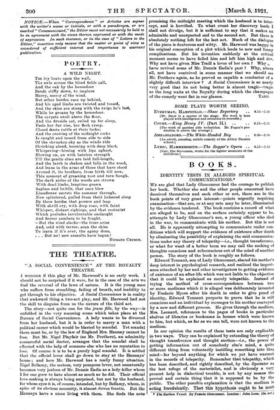THE THEATRE.
" A SOCIAL CONVENIENCE " AT THE ROYALTY THEATRE.
I WONDER if this play of Mr. Harwood's is an early work. I should not be surprised if it were, for in the case of the arts we find the reversal of the laws of nature. It is the young man who suffers from stumbling, failing of breath, and inability to get through to his objective. A Social Convenience is in reality that awkward thing a two-act play, and Mr. Harwood had not the skill to disguise from us the nature of the third act.
The story—not quite one for the jeune fills, by the way—is unfolded in the very amusing scene which takes place at the Bureau of Social Convenience. A lady wants to be divorced from her husband, but it is in order to marry a man with a political career which would be blasted by scandal. Yet scandal there must be, or by the law of England Mrs Hannay cannot be free. But Mr. Nigel Playfair (as Mr. Prothero), an admirably resourceful social doctor, arranges that the scandal shall be effected with the help of someone else who has no reputation to lose. Of course it is to be a purely legal scandal. It is settled that the official lover shall go down to stay at the Hannays' house ; and here Mr. Harwood has a really funny situation. Nigel Bellamy, the serious, very pompous lover, not unnaturally becomes very jealous of Mr. Dennis Eadie as a lady-killer whom I for one grew to hate almost as much as he did. Their official love-making is always being surprised, but not by the husband, for whose eyes it is, of course, intended, but by Bellamy, whom, in spite of its obvious necessity, it almost drives frantic. But the Hannays have a niece living with them. She finds the note promising the midnight meeting which the husband is to inter- cept, and is horrified. To what event her discovery leads I shall not divulge, but it is sufficient to say that it makes an admirable and unexpected end to the second act. But there is absolutely nothing left for the last act. Much of the dialogue of the piece is dexterous and witty. Mr. Harwood was happy in his original conception of a plot which leads to new and funny complications. But his invention suddenly at the critical moment seems to have failed him and left him high and drv. Why not have given Miss Train a lover of her own ? Why L have revived some of Mr. Dennis Eadie's past ? Why, above all, not have contrived in some manner that we should see Mr. Prothero again, as he proved so capable a conductor of a slightly difficult interview ? A Social Convenience is so nearly very good that its not being better is almost tragic—tragic as the long waits at the Royalty during which the champagne of the comedy went flat in our glasses. TARN.


































 Previous page
Previous page